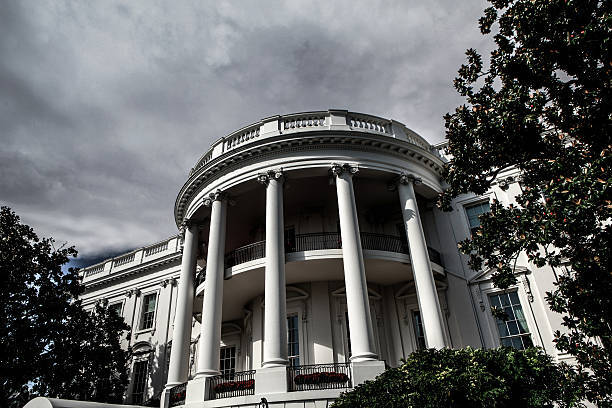By: Chris Owens and Samantha Sanders
From day one, the Trump administration and Elon Musk have unleashed an unprecedented assault on the federal workforce. Recently, this has included announcing intentions to cut 15% of U.S.-based State Department staff, 10,000 jobs in the nation’s health care agencies, 80,000 Veterans Affairs positions, 7,000 in the Social Security Administration, and tens of thousands more across the federal government.
Meanwhile, President Trump has illegally fired heads of independent boards and agencies (in some instances, rendering these independent bodies unable to act), not to mention 17 inspectors general and the government’s chief ethics official and head of whistleblower protection—the watchdogs for good government. And in late March, Trump issued an executive order attempting to end workers’ collective bargaining rights at a host of federal agencies.
But all of that is just the beginning. Beyond decimating the public sector, Trump appears intent on politicizing a significant share of what remains. By signing Executive Order (EO) 13957 and issuing a newly proposed Office of Personnel Management (OPM) rule, Trump will be able to fire wide swaths of the federal workforce at will, representing the most dramatic erosion of civil service protections since the Pendleton Act of 1883 created the federal civil service.
EO 13957 outlines a process for revoking civil service protections for certain federal workers who traditionally discharge their responsibilities consistent with the priorities of the administration in office. The EO provides that civil servants in “positions of a confidential, policy-determining, policy-making, or policy-advocating character” should be classified as “Schedule Policy/Career” (previously known as “Schedule F” in the first Trump administration), and outlines steps for agencies to follow in recommending positions to reclassify to the OPM director. The director, in turn, must “promptly” recommend to the president positions to be reclassified to Schedule Policy/Career in accordance with OPM’s corresponding guidance memorandum, with the president making the final decision regarding positions to classify as Schedule Policy/Career. Employees whose positions are reclassified become “at-will” employees, subject to discipline or termination with no appeal rights if they do not adequately toe the line with respect to the president’s policy views.
The proposed rule claims that employees in this category will not have to “personally or politically support the president.” However, that assertion seems dubious—at best. Just last week, the Office of Special Counsel—an independent watchdog agency whose previous head was fired by Trump in February—reinstated a 2020 advisory opinion that allows civil servants to wear or display swag (like a MAGA hat) overtly supportive of an incumbent officeholder, while continuing to prohibit such partisan displays on behalf of candidates for office—a distinction that seems to turn the Hatch Act on its head. Moreover, Trump has shown little tolerance for any hint of political disloyalty, hesitation about policy agendas, or questioning of legality of administration actions. Trump even bucked longstanding Supreme Court precedent in firing the chair of the National Labor Relations Board (NLRB), an independent agency, for “unduly disfavoring the interests of employers” in her decisions to protect workers’ rights to form unions.
If, as the new “Schedule Policy/Career” classification allows, wide swaths of the federal workforce could be fired at will—without any process—it would not be hard for the administration to target and terminate people based on political views and just claim whatever justification they choose for doing so.
Earlier estimates of the impact of the new classification suggested that as many as 50,000 employees could be affected by this change, but if past is prologue, that number is likely “a floor rather than a ceiling.” For example, shortly before the end of Trump’s first term, OPM signed off on a plan to move more than two-thirds (68%) of the Office of Management and Budget’s (OMB) workforce into Schedule F. Released documents showed that OMB had applied a broad read in determining which positions to reclassify, including “[i]n addition to policy analysts and attorneys, … jobs like statisticians, IT specialists, and even office managers and executive assistants.”
A December 2023 review of research on the impacts of greater politicization of public services highlights the significant adverse consequences likely to result from removing civil service protections from policy-influencing employees, including:
- Greater federal workforce turnover, with changes in presidential administrations ushering in new cadres of policy-influencing employees, causing increased instability in agencies’ interpretations and implementations of laws;
- Decline in the institutional history and technical expertise career civil servants develop and bring to bear in formulating policy;
- Less accountability to Congress regarding the laws that agencies administer; and
- More opportunities for political favoritism in federal contracting.
Federal regulation and policymaking affect many aspects of our lives and every corner of our economy. Federal employees in policy-influencing roles can hone their skills and discharge their duties most faithfully to congressional intent and statutory purpose if they are free from political pressure. But federal employees stripped of civil service protections risk being forced to choose between doing their jobs consistent with their constitutional oath—or toeing a political line.
Here’s one example:
Civil service employees within the Occupational Health and Safety Administration (OSHA) develop industry-specific expertise, deep knowledge of workplace hazards, and an institutional understanding of the scope and demands of health- and safety-related law and policy. OSHA civil servants apply this expertise in researching and developing occupational safety and health standards that will advance the “purpose and policy” of the OSH Act “to assure so far as possible every [working person] in the nation safe and healthful working conditions…”
But under Trump’s reclassification of these civil servants’ positions, nonpartisan experts risk losing their jobs—and any right to challenge their termination—if their assessments of what the law requires or allows collide with political priorities that may be more aligned with the interests of campaign donors than the purposes of the law and mission of the agency.
Here’s another example:
The Food and Drug Administration (FDA) ensures the safety of our food and pharmaceutical supply, and effective policy and regulation in both areas depend on deeply informed expertise backed by strong science. In the first Trump administration, with full civil service protections in place for career employees, the FDA’s science-based research and approval process for COVID-19 vaccines moved on a remarkably fast track and saved untold numbers of lives. But swapping highly skilled nonpartisan civil servants with people chosen largely based on political alignment threatens the nation’s ability to respond quickly and effectively to the next pandemic or other crises.
Every partisan change of administrations ushers in a new cast of political appointees who, consistent with the administration they serve, set and implement agency priorities aligned with those of the president. These political appointees directly or indirectly oversee the work of career civil service employees in policy-influencing positions. While career civil servants may engage in robust debate with political appointees over policy interpretation and application, engagement based on experience and expertise actually strengthens policy development, interpretation, and viability. And in the end, it’s the political appointees who call the shots.
Maintaining civil service protections for policy-influencing employees is crucial to sound policy development that serves the public interest. And Americans know this—a 2024 poll found that a vast majority (72%) do not think the president should be allowed to fire civil servants for any reason they choose. Undoing these protections, as EO 13957 directs, is a bad deal for public servants and, ultimately, for all of us.

